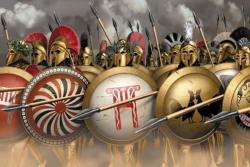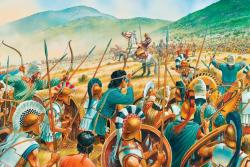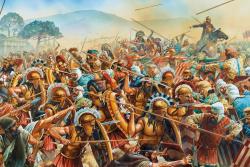Plataea Anniversary
 The Battle of Plataea - 379 BC - Today is the 2,500th Anniversary of this memorable battle. On 27th August 379 BC allied Greek warriors annihilated a larger invading Persian army. This ferocious battle was the final clash of the second Persian invasion of Greece, with a Greek victory putting a final end to the Persian empire's western expansion. This decisive battle occurred near the ancient Greek city of Plataea, located in southeastern Boeotia, south of Thebes. An alliance of Greek city-states including Sparta, Athens, Corinth, Megara and others confronted the Persian army of Xerxes I along with a large number of pro-Persian Greeks, mainly from Thebes. The previous year, in 480 BC, the invading Persian force, led by King Xerxes himself, had invaded Greece with a vast army and navy.
The Battle of Plataea - 379 BC - Today is the 2,500th Anniversary of this memorable battle. On 27th August 379 BC allied Greek warriors annihilated a larger invading Persian army. This ferocious battle was the final clash of the second Persian invasion of Greece, with a Greek victory putting a final end to the Persian empire's western expansion. This decisive battle occurred near the ancient Greek city of Plataea, located in southeastern Boeotia, south of Thebes. An alliance of Greek city-states including Sparta, Athens, Corinth, Megara and others confronted the Persian army of Xerxes I along with a large number of pro-Persian Greeks, mainly from Thebes. The previous year, in 480 BC, the invading Persian force, led by King Xerxes himself, had invaded Greece with a vast army and navy.
Xerxes had scored victories at the Battles of Thermopylae and Artemisium and conquered Thessaly, Boeotia and Attica, destroying Athens itself. However, at the ensuing Battle of Salamis, the allied Greek navy had won an unlikely yet total victory, therefore preventing the further Persian conquest of the Peloponnese. Xerxes then retreated with most of his army, leaving his trusted general, Mardonius, to finish off the Greeks the following year, as their army was essentially intact. In the summer of 379 BC, the Greeks assembled a huge allied army, marching out of the Peloponnese to confront the Persian forces in Greece once and for all.
 According to the historian Herodotus, the allied Greek army for the Battle of Plataea numbered a total of 108,200 warriors, including hoplite contingents of 8,000 Athenians, 5,000 Spartiates, 5,000 Peleponnesians, 5,000 Corinthians, 3,000 from Megara, 3,000 from Sicyon and 300 from Hermione. The Persians numbered 110,000 troops, including pro-Persian Greeks and 5,000 cavalry. As the Greeks approached, the Persian forces retreated to Boeotia and built a fortified camp near Plataea. After two days of a stand-off, the Battle of Plataea began with Mardonius sending in his cavalry to attack the Megarians and Athenians. The Athenian archers helped the Greeks to hold their lines. Both sides then held their positions for another week or so, with both armies remaining on their advantageous terrain.
According to the historian Herodotus, the allied Greek army for the Battle of Plataea numbered a total of 108,200 warriors, including hoplite contingents of 8,000 Athenians, 5,000 Spartiates, 5,000 Peleponnesians, 5,000 Corinthians, 3,000 from Megara, 3,000 from Sicyon and 300 from Hermione. The Persians numbered 110,000 troops, including pro-Persian Greeks and 5,000 cavalry. As the Greeks approached, the Persian forces retreated to Boeotia and built a fortified camp near Plataea. After two days of a stand-off, the Battle of Plataea began with Mardonius sending in his cavalry to attack the Megarians and Athenians. The Athenian archers helped the Greeks to hold their lines. Both sides then held their positions for another week or so, with both armies remaining on their advantageous terrain.
The Persians blocked access to the Gargaphia spring which was the Greeks’ main source of water. At the same time, Mardonius then unleashed all his cavalry in a full frontal attack on the Greek lines. The Greek battle-line fragmented and seemed to be in full retreat. As his cavalry withdrew, Mardonius ordered the rest of his forces to pursue the retreating Greeks and finish them off. Instead, however, the Spartans, Athenians, and Tegeans halted and counter-attacked, routing the lightly-armed Persian infantry and managing to kill Mardonius, after a Spartan hoplite Arimnestus simply hurled a rock at him. The Persians were in full retreat.
 The remnants of the Persians were forced back across the river in disarray, to reoccupy their fortified camp. The Athenians, Spartans, and Tegeans then stormed the Persian camp, causing more heavy casualties amongst the invaders, slaughtering many, and forcing the rest to flee. The few survivors of the Persian army, under the command of Artabazus, then retreated back to Asia Minor. The destruction of the invading army, and the remnants of the Persian navy, apparently defeated on the same day at the Battle of Mycale, put an end to the Persian Empire's ambitions to conquer all of Greece. The Greek victories at Marathon, Salamis and Plataea had ensured the survival of Greece and allowed for Greek civilization to flourish and become the foundation upon which all Western cultures would be based.
The remnants of the Persians were forced back across the river in disarray, to reoccupy their fortified camp. The Athenians, Spartans, and Tegeans then stormed the Persian camp, causing more heavy casualties amongst the invaders, slaughtering many, and forcing the rest to flee. The few survivors of the Persian army, under the command of Artabazus, then retreated back to Asia Minor. The destruction of the invading army, and the remnants of the Persian navy, apparently defeated on the same day at the Battle of Mycale, put an end to the Persian Empire's ambitions to conquer all of Greece. The Greek victories at Marathon, Salamis and Plataea had ensured the survival of Greece and allowed for Greek civilization to flourish and become the foundation upon which all Western cultures would be based.